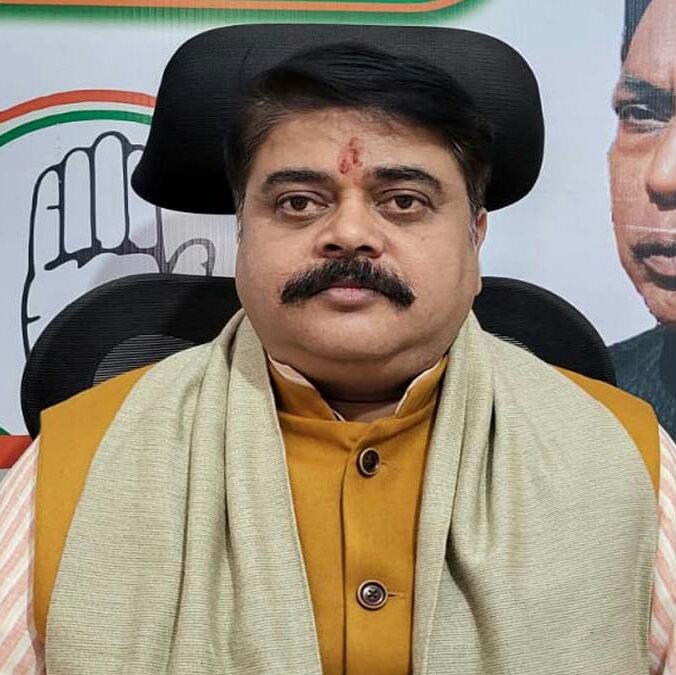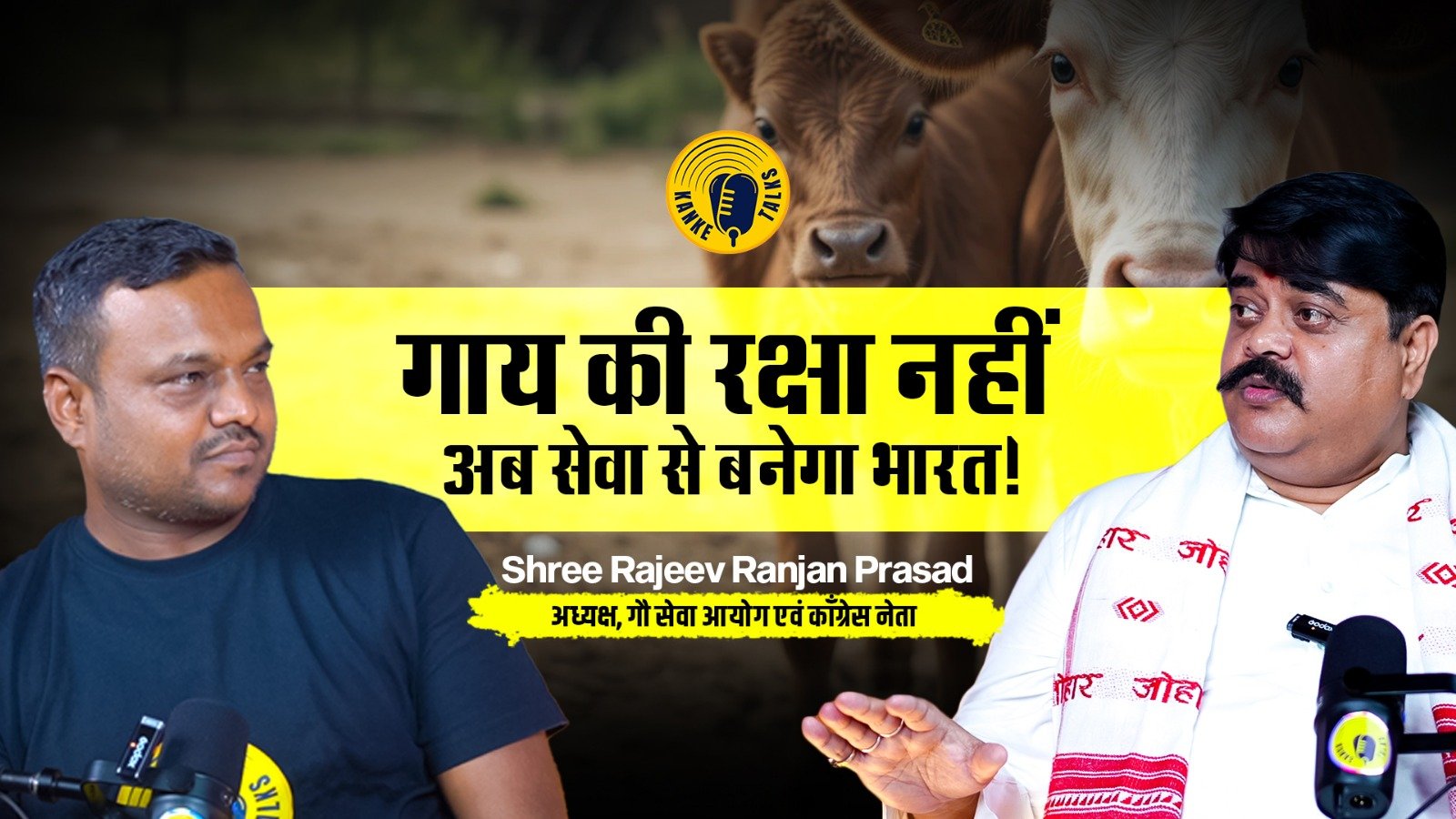On a rainy afternoon in Ranchi, the scent of pakoras in the air and tea warming eager hands, listeners tuned in to a special episode of Kanke Talks. But this wasn’t just any monsoon podcast. This episode featured a man on a mission — Rajeev Ranjan Prasad, Chairman of the Jharkhand Gau Seva Commission. What began as a conversation about cows quickly unfolded into a deep, transformative narrative of faith, economy, ecology, and identity.

More Than Faith — A Movement Rooted in Sanatan Dharma
“Cow service isn’t a political agenda,” Rajeev stated passionately. “It’s our Sanatani heritage.” In a landscape where gau seva often gets politicized, Rajeev stands tall, wearing his faith unapologetically but with purpose beyond religious symbolism. For him, the cow is not just sacred; it’s a keystone of rural prosperity, self-reliance, and ecological harmony. He wasn’t here to make cows a subject of rhetoric. He was here to tell stories of cow dung becoming bricks, of cow urine being used in biofertilizers and medicine. “Amazon and Flipkart are now selling cow dung diyas,” he said with a smile. “And rakhis made in Ranchi from cow dung are being exported.” Suddenly, the sacred cow wasn’t just a divine figure — she was an economic asset.
Ranchi’s Concrete Trap and a Wake-Up Call
Rajeev’s eyes softened with concern as he remembered his childhood Ranchi — lush, green, where rain disappeared into the earth within minutes. Now? “We laid concrete nets everywhere,” he lamented. “Even over drains and rivers like Harmu.” He blamed short-sighted city beautification projects for the waterlogging nightmares of today. “Forty-two percent of the country’s minerals are stored in Jharkhand,” he pointed out, “yet villages here still struggle for drinking water.” The irony isn’t lost on him. He’s not just addressing the problem; he’s walking through it — literally. From urban flooding to shrinking playgrounds, Rajeev has seen Ranchi transform, and not always for the better.
Legacy in the Blood, Leadership in the Bones
Politics, for Rajeev, wasn’t a choice; it was inheritance. His grandfather, Late Devakinandan Prasad, was a freedom fighter and the region’s first legislative councillor. His family includes Jharkhand movement pioneers and Congress youth leaders. “Politics,” he says, “is in my DNA.” But Rajeev didn’t ride coattails. After studying sociology, he worked in marketing before returning to his roots — quite literally — in cow shelters. He founded cultural events like the Dahi Handi competition in Ranchi and supported Durga Puja committees, blending devotion with community leadership. And then came the moment in Mathura’s Prem Mandir — a spiritual spark when he received the official notification appointing him as Chairman of the Jharkhand Gau Seva Commission.
Not Just a Cow, but a Cause
“Why only cows?” critics ask. Rajeev doesn’t flinch. “Because cows connect faith, livelihood, and ecology,” he answers. His tenure has seen more than speeches — he’s conducted physical verification of remote gaushalas, organized national cow entrepreneurship summits, and launched women-centric training programs. In Ranchi, 200 women from 20 blocks were trained to create cow-dung products like incense sticks, diyas, and eco-friendly gifts. “A woman can earn ₹10,000 monthly working just two hours a day,” he said proudly. Plans are in motion to scale this to 5,500 women across the state by 2025.
Gaushalas as the Engine of Rural Economy
Through composting, biogas, and medicinal products, gaushalas are becoming sustainable enterprises. “Cow dung is replacing bricks, tiles, and even plywood,” Rajeev explained. “It’s an ecological revolution.” He talked about Giridih’s Panchamba Gaushala — self-reliant and thriving, producing vermicompost worth crores. But it’s not all success stories. “Marketing and awareness are lacking,” he admitted. “That’s where we need to push harder — making cow service not just spiritual, but practical.”
The Vision of Gau Tourism and Eco-Conscious Future
Rajeev’s most imaginative plan? Gau tourism. Parks, sanctuaries, cafes in five divisions of Jharkhand, where families can visit, learn, and connect with cows — not just for milk but for mindfulness. “Why not turn compassion into commerce?” he asked. “Let children see cows not on streets, but in sacred, sustainable spaces.”
Critics, Challenges, and Convictions
Rajeev has faced opposition — some say his funding increases allow “commissioning.” He doesn’t hesitate: “Visit any gaushala, check the records, see where the money goes. We pay ₹100 per cow per day, the highest in India.” Even in Congress circles, promoting cow service wasn’t easy. “But change is visible,” he said. “Recently, minority women trained in cow dung processing — that’s the new India.”
A Sustainable Dream — One Cow at a Time
Rajeev believes cows can change Jharkhand — not just spiritually, but economically. “If Amul can become a brand,” he said, “why can’t we do it here?” From cow dung paints in Saraikela to desi cow milk, Jharkhand’s potential is vast. He’s pushing for school programs, monthly gaushala visits, and greater youth involvement. “You can’t force spirituality,” he said, “but you can show how faith leads to prosperity.”
Epilogue: A Click Away from Change
Today, with a single click, you can donate to Jharkhand’s cow shelters via the Commission’s website. “We’ve gone digital,” Rajeev said proudly. “But this isn’t just about apps — it’s about awareness.” As the podcast ends and the rains resume, one thing is clear: Rajeev Ranjan Prasad is not merely serving cows. He’s reshaping an ideology — turning devotion into development, and tradition into transformation.

No responses yet